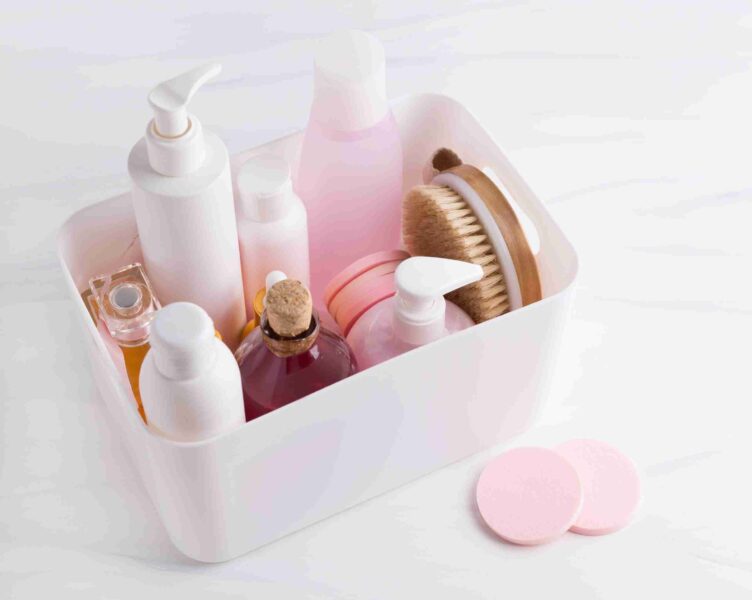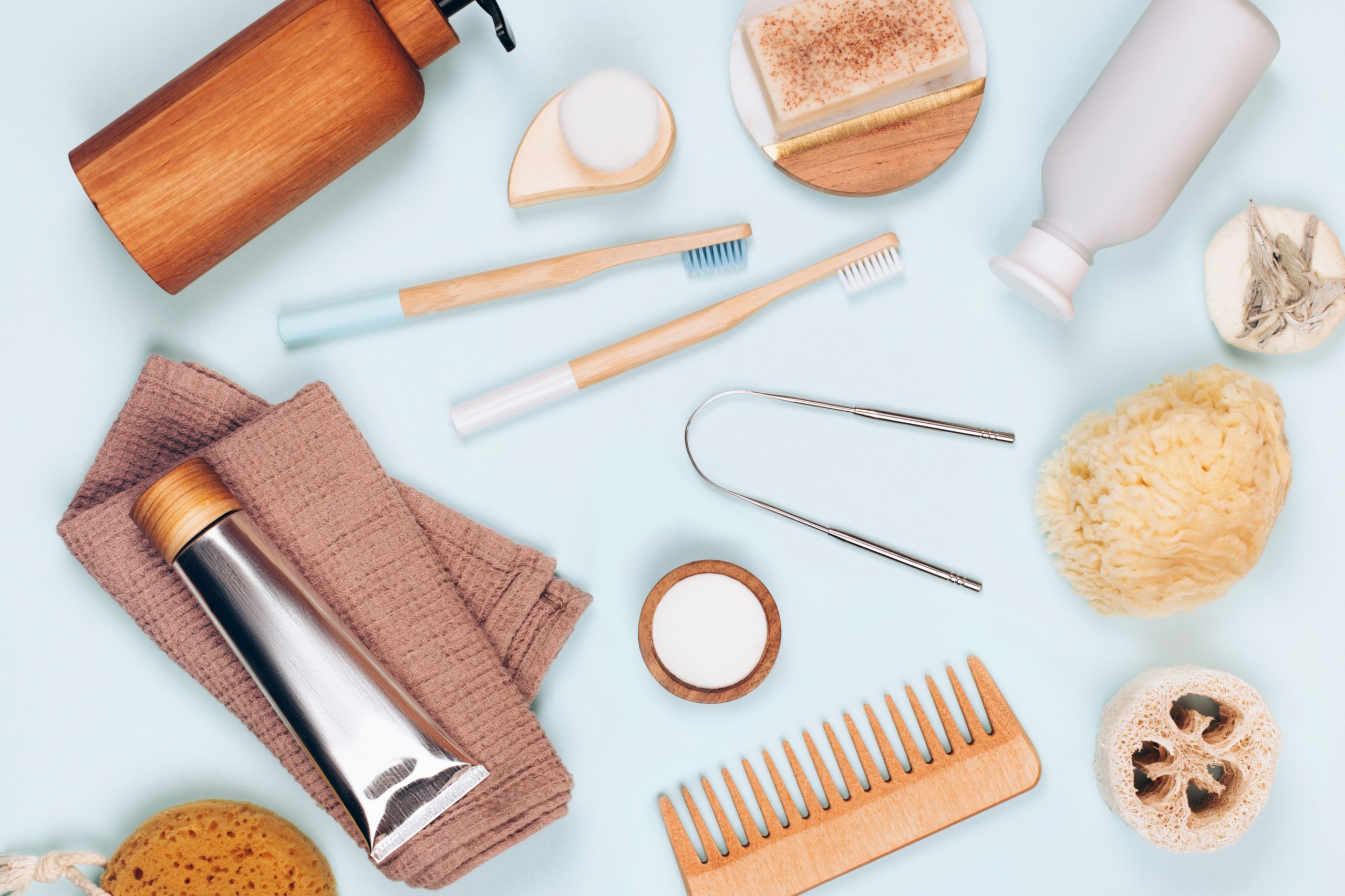‘Spring Clean’ Your Skin Care This Easter!
Across the world, spring is seen as a time for new beginnings – starting over and forming new positive habits. At this time of year, many cultures have a tradition of ‘spring cleaning’ their homes, but perhaps one area that hasn’t occurred to you to tidy up is actually one of your most important. We’re talking of course about your skincare routine. With this in mind, we’ll be taking you through our top tips for streamlining your skincare, using our handy 3 ‘D’s – Declutter, Decant and Disinfect!
1. Declutter
The first step when having a good sort out is decluttering. It can often be the most difficult stage, particularly for those of us prone to product hoarding, but it’s so important to keep on top of what you have and make those necessary cuts.
One of the most important things to be aware of is the age of your products. Many skincare products containing active ingredients (eg. retinols or acids, etc) or sun protection factors (eg. sunscreens) will helpfully provide you with a use-by date or a symbol known as PAO (‘period-after-opening), which advises you on how long a product can be kept after first opened. This symbol will resemble a round pot with its lid hovering above, and inside will have the number of months which it can be considered fresh – 6M is 6 months after opening, 24M is 24 months (2 years) after opening and so on.
These symbols and indeed, expiration dates more generally, also apply to any cosmetics you might use. Products like foundation and other liquid makeup typically lasts around 6 months, whilst powder products last a little longer. Mascara should be changed at least every three months and you should not apply it when you have an eye infection or stye as it can transfer the infection. Even if your products do not have a PAO symbol, you should ensure that you are aware of any changes in their consistency, texture, colour or smell as these are indicators of spoilage. As you can imagine, if a product is out-of-date, it could be transferring bacteria to your skin, causing breakouts and infections. Additionally, being out of date can cause products to be less effective, which for products like sunscreen, can potentially be dangerous.
If you’re a beauty junkie (trust us, we get it!), it can be tempting to fall into the trap of hoarding product, but you must try to break this habit. If you have lots of different products in use at any one time, you may find that some expire before you are able to use them up, which is a disappointing waste. If you have unopened or ‘back up’ products, ensure that you do not start them until you have finished those equivalent products which you are already using.
It is also worth reviewing your skincare periodically to determine whether there are any seasonal swaps which you should be making. Maybe you’ve been using a thicker moisturizer in the colder winter months and now your skin isn’t so dry, it could be worth using a lighter texture. It is also common to use more exfoliants or retinols during the winter weather, but as we head into the brighter spring/summer days, especially if you have any foreign holidays booked, it may be worth putting the use of such products on hold as they can make skin more photosensitive. SPF30+ is a must-have in your routine all year around, but in the spring and summer, you may want to upgrade to a higher factor, around 40 or 50. Remember, when you are introducing or removing ingredients from your routine, it’s always worth checking in with your therapist. Mixing and matching actives, especially when they are new to you, without professional guidance can be risky, especially if you have sensitive skin.

2. Decant
The second step, decanting, should definitely be kept in mind when decluttering. If during your sort-out, you find any products with lost lids or otherwise broken packaging, it’s time to decant!
If the packaging the product comes in is no longer airtight, the product inside is at increased danger of spoiling or attracting bacterial and fungal growth – none of which you want to be accidentally putting on your skin! Additionally, increased air or light exposure can also denature some active ingredients, so in order to keep your products at their most efficacious, make sure they’re kept airtight and stored correctly.
Highstreet pharmacies or online stores will offer empty beauty product packaging such as jars, tubes or plastic pots, usually designed for travelling. You can sterilize these at home yourself (don’t worry, we’ll cover this soon!) and decant the products into the new, unbroken packaging, ensuring that they stay fresher and useable for longer.
When you are transferring the product into its new container, it’s important to make sure that you don’t use your fingers, which can harbour bacteria. We advise using a plastic or metal spatula which can be easily disinfected before and after use. Many such implements specifically designed for use with beauty products are available on the market, and lots of products are now sold with their own too. We definitely suggest picking some of these up as they are useful not just during this process but also for daily use. When using products such as moisturisers and eye creams, which may come in jar or tub packaging, you can scoop out the product with this spatula before applying to your skin. This prevents you from transferring any bacteria from your fingertips into the product, which again, can encourage spoilage.

3. Disinfect
So now you’ve reviewed your products, you’re storing them securely and you’ve bought your spatulas… What’s next? It’s time for our final step – disinfecting!
You should be sanitizing tools like product spatulas and tweezers after every use. This can be done using boiling water and sterilizing tablets, which can be purchased in highstreet pharmacies. You should also wash your makeup brushes at least once a week; ideally after every use, particularly if you struggle with skin concerns such as acne and rosacea – dirty brushes can transfer bacteria across the skin, potentially worsening inflammation. Makeup sponges should be rinsed frequently and replaced every few months.
You should also regularly wipe down and disinfect the packaging on your skincare and makeup products and clean any boxes or bags used to store them. When products and brushes are loose in makeup bags, for instance, this will prevent any bacteria being transferred between them. You should also be washing any flannels and towels which touch the skin as often as possible. Towels for the body can be used a little longer, but any towels which frequently touch the skin on your face, particularly if you suffer with acne or other bacterial conditions, should be changed daily, if possible. We would advise purchasing up to a week’s worth of such products so that you can change them frequently but wash as and when you have a full load, to save water.




